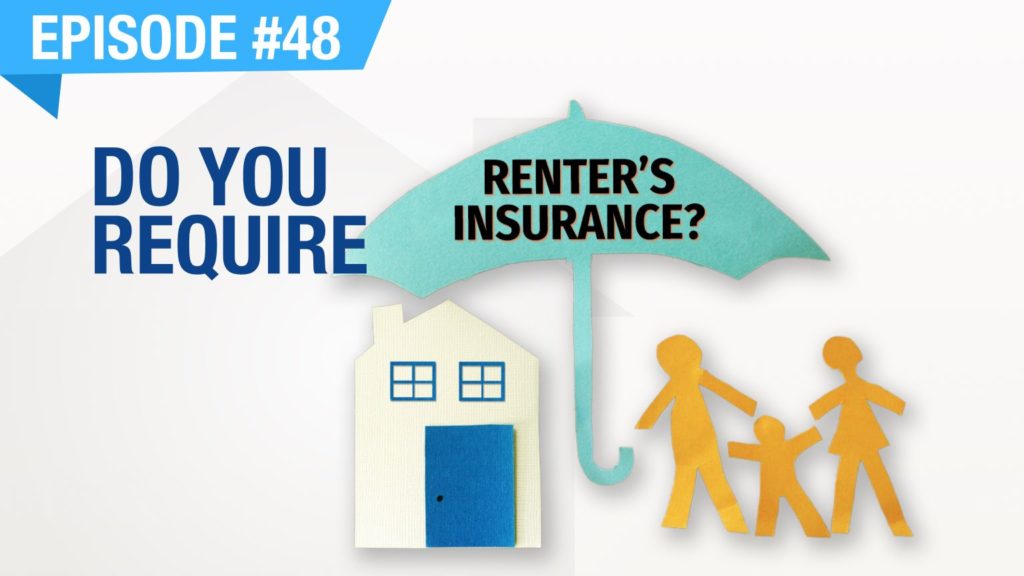
Do you / should you require your Tenants to have Renter's Insurance? Even if you don't yet have any properties, you will soon, right? Right!? So then this is the question that you should ask and answer, as it relates to one of the critical aspects of how you'll run your Rental Property business.
----------
Intro...
Welcome to Episode #48 - Do You Require Renter's Insurance?
That's the question... "Do You / Should You Require Your Tenants To Have Renter's Insurance?"
Well, when I first started out, I didn't. It was completely optional - based solely upon the Tenant's preference. Although I did make them sign a waiver, which stated they were voluntarily choosing NOT to get insurance coverage of their own, and so they fully understood that their personal belongings were NOT covered by my property insurance as the owner.
The system that I use to generate my lease has a template that gives the option of stating that failing to have renters insurance is a lease violation (or not); however, I would go with the choice that it's highly recommended, but not required - and then add in the insurance waiver to become a part of the lease.
I never really thought much about this, as my homes are in "good" locations that are not obviously prone to suffer a break-in - and I even offer my tenants Vivint Alarm Systems to further discourage a break-in. But I later came to understand the risk to me as the owner / Landlord - by not requiring Renter's Insurance.
You see, it's not just a matter of covering their personal belongings in the event of a break-in - which is all that I was thinking. But also fire or a tree falling on the property (which does happen) - or any other such event that causes damage to the Tenant's property within the home. But it's also protection against someone getting hurt inside the home or on the property.
Should anything take place at the home that might become an insurance claim or even becoming a lawsuit - having Renter's Insurance in place will likely mean that it becomes the first source of coverage, before my owner's property insurance comes into play.
This is a significant consideration. For example, I've got several properties with coverage from the same provider. So if I were to have a claim against one of those properties, it could easily result in my coverage going up (not just for the property in question) - for ALL of my properties with that provider. They could even cancel my coverage for that property, or all of them. And once you are known to have filed a claim on coverage with one provider, it can sort-of "black ball" you with others.
It could easily be the case that a claim against my property insurance could end up causing real problems for me with coverage for other (or all) of my properties. Yet with renters insurance in place, many claims may never even touch my property insurance - and be confined solely to the Tenant's Renters Insurance.
So just think how much better you'll sleep, knowing that in the event of a break-in or fire or someone getting hurt at your property - that you've got NOT ONE, but TWO Insurance Policies in place before things reach you (or your LLC) - and that your insurance policy may never even need to come into play, as the Tenant's policy may be first in line.
So I've taken to now requiring Renter's Insurance and that the management company and/or the owning entity for the property be listed as an additional insured on the Tenant's Renter's Insurance policy. In this way, I am directly covered - and also get notified in the event of a lapse in the policy coverage.
And to make things easier for my tenants, the same system in which they applied for the rental and where they primarily pay their rent (Cozy.co) - is also where they can order a Renter's Insurance policy.
But I've recently come across a study on Renter's Insurance a the ConsumerAdvocate.org Website (and I'll post a link in the show notes): https://www.consumersadvocate.org/renters-insurance - which provides good insight into the features, options and providers of Renter's Insurance Policies.
There is even an FAQ section within this report (at: https://www.consumersadvocate.org/renters-insurance#toc-faqs) - that answers some common questions Tenants often have as to why they even need Renter's Insurance - as they may not think they own anything of significant value such that it needs to be insured.
I found this research and report to be very insightful, as it covers reviews of: Progressive; State Farm; Amica; Liberty Mutual; and several other providers of Renters Insurance.
So consider if you'll be making the same policy change that I made - and REQUIRE RENTERS INSURANCE of all tenants going forward. If so, you can integrate information such as found in this report to explain this requirement to your existing and prospective new tenants.
Why not put a layer (an additional layer) of protection between you and any liability? Checkout Episode #45 on "LLC Obsession" for details of how people get fixated on LLC's for liability protection - but your #1 protection is how you operate your business. And adding an additional layer of protection through a Tenant Rental Insurance requirement (that costs you nothing) - provides a great deal of protection and piece of mind for both you and your Tenants. How better to run a Rental Property business?
And having this requirement in place, may be a good excuse to start allowing pets in your Rental Properties - which itself can be a source of additional revenue. And if you're already allowing pets, then you certainly want the additional protection of requiring those Tenant's to have Renter's Insurance. Or do you want to have someone get bitten by a dog that lives on your property and now it stands for you and your insurance to pay their medical bills. I just don't need those headaches in my life.
Best of all, if you state upfront that a Tenant paid Renter's Insurance policy must be in place as a requirement for Occupancy - it will cause a certainly number of prospective Tenant's to self-eliminate themselves for consideration. And those would have been the Tenant's who cause the majority of your problems. Again, I don't need those headaches in my life.
If the relatively small cost of a Tenant Renter's Insurance Policy is a cause for concern on their part, then it means their finances are extremely tight - which is certain to quickly become YOUR problem, when they can't pay the rent on time. It will also mean they are unable to properly care for the home, so wear and tear will increase.
They may not think their belongings are even worthy of insurance protection, so what care do you think they'll apply to your property if they care so little for their own stuff so as to be wiling to protect it. Or worse - maybe they think it is YOUR responsibility as the Landlord to protect their things, which right there shows you how their Tenancy is going to go.
So many red flags are raised when a person is not even willing (or able) to pay a few bucks to protect their own stuff. So make this a requirement of Tenancy - even in cases where the rent is subsidized by a third party organization or entity (such as Section 8). And you can even go as far as making it a lease violation for there ever to NOT be insurance in place with you listed as a loss payee.
This is importantly because it is not just a policy to protect the Tenant's belongings, but also coverage for certain aspects of the property as well. So the tenant is protecting their own stuff, while also extending that protection over certain aspects of your property also.
And the perfect example of that may be one of the fears of Landlords everywhere - when a disgruntled Tenant places cement in the toilets just to get back at you for evicting them or something.
It's certainly never happened to me, and is likely one of those urban legends as to if it has ever happened with any frequency so as to make it a real thing to be concerned about. But how much better for you if it did happen (or something like it), and you have a Renter's Insurance Policy in place that lists you as the loss payee as the damaged party (versus listing only the tenant). And even with you listed as the loss payee, I know its debatable if the insurance provider would actually pay out in such a scenario - but that's not the point I'm trying to make.
My point is that with a Renter's Insurance requirement enforce, if you ever do end up with hostility between you and a Tenant over an eviction situation (it will surely happen even for me at some point)... You may be able to bring some sanity and restraint back into the situation (and make the Tenant think twice about doing any damage) - by mentioning (and thereby reminding them), that any property damage done may become both a criminal and legal matter for them that could linger for years. But that you'll likely be protected and made whole by their own Renter's Insurance policy, which could then get charged back to them.
True or not, it's possible under certain circumstances - and may be just the realization a hostile Tenant might need to understand they cannot really do you any harm without potentially harming themselves far worse in the attempt. And so much of being a successful Landlord is all about how you deal with people - which should be in a reasonable manner that lessens the likelihood of blow-back upon yourself. And I like for as many protections as possible to be placed in between me and any such blow-back - even if it just a perception.
Renter's Insurance is just one such protection, perception or whatever you want to consider it's value in the end - but I'd rather have it there than not. And I don't even allow for the option of it not being their any longer. How about you?
Outro...
Disclaimer
Owner's Property Insurance is not the only type of Insurance that you need to consider... Another is Renter's Insurance. And do you / should you require your Tenants to obtain Renter's Insurance? That's the question being asked and answered (from my point of view) in this episode of the... and Landlord! Rental Real Estate Investing Podcast.
Here I go into details as to some of the ways you're protected by having Tenant's obtain their own coverage in the form of Renter's Insurance. Not least of these protections is that the mere fact that you've impose this requirement will result in certain prospective Tenants (who might have been problematic) - self-eliminating from consideration of occupying your property in the first place. Putting reasonable (and LEGAL) barriers to Tenancy in place will help to get you the best Tenants - and a Renter's Insurance requirement can be just one means of doing so.
Much of what we discuss on this Podcast is about how to be the best Landlord you can be - with the fewest headaches. Well, having a Renter's Insurance requirement for Tenants can be one of many means to that end. Renter's Insurance is a protection not just for your Tenant, but for your property, for YOU and your LLC - paid for by your Tenant. What's better than a benefit for you that is paid and provided by someone else - and for which they benefit as well?
